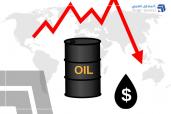Oil managed to rise today despite weak demand forecasts and disappointing data from China.

Crude oil prices rose significantly during trading on Monday, despite the slowdown in inflation growth in China in November to 0.2% from 0.3% in October, which reflects a deterioration in demand within the world's largest crude importer, as well as weak demand forecasts for oil in the coming year.
However, recent developments in Syria have heightened the uncertainty surrounding the Middle East; the Syrian opposition announced on state television yesterday, Sunday, the ousting of President Bashar al-Assad and the end of a 50-year family dynasty in a surprise attack, raising fears of a new wave of instability in a region already ravaged by war.
Furthermore, crude oil prices found support from recent comments made by Chinese President Xi Jinping, which emphasized the importance of complete readiness to achieve the planned economic goals for the coming year, and indicated the necessity to enhance confidence in the ability to succeed during the implementation of economic work.
These statements reflect the Chinese authorities' commitment to reviving economic activity in the country, and they may adopt new stimulus measures for fiscal and monetary policies, which could positively impact oil demand from China— the largest importer and the second-largest consumer of crude oil in the world.
Current Crude Oil Prices
As a result of the above, crude oil achieved strong gains; the spot prices for Brent crude rose by about 1.30% to trade near $71.70 per barrel. Additionally, spot prices for West Texas Intermediate crude jumped approximately 1.51% to reach around $67.78 per barrel.
The rise in crude oil prices today follows a second consecutive week of losses, concluding the previous week that ended on December 6, during which Brent crude lost about 2.10% of its value and U.S. crude fell by about 2.44%.









